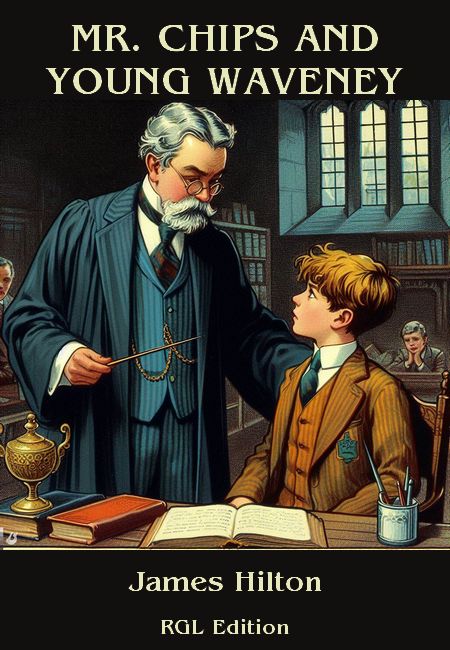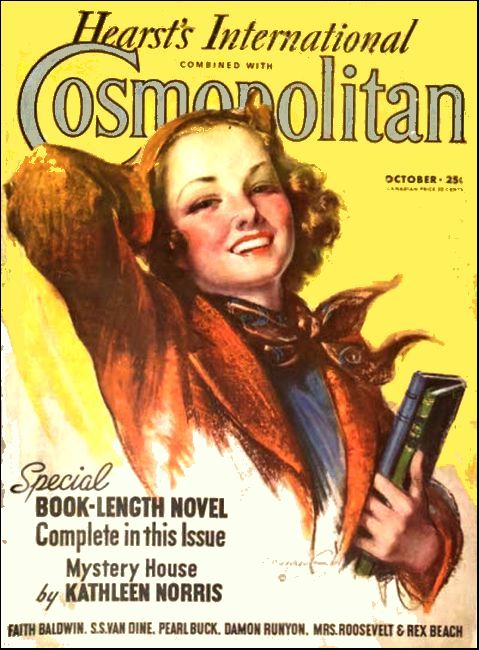
RGL e-Book Cover©
Based on an image created with Microsoft Bing software
Roy Glashan's Library
Non sibi sed omnibus
Go to Home Page
This work is out of copyright in countries with a copyright
period of 70 years or less, after the year of the author's death.
If it is under copyright in your country of residence,
do not download or redistribute this file.
Original content added by RGL (e.g., introductions, notes,
RGL covers) is proprietary and protected by copyright.

RGL e-Book Cover©
Based on an image created with Microsoft Bing software


Cosmpolitan, October 1935, with"Mr. Chips And Young Waveney"
"Be kind, my boy, even when you're fighting systems," Chips advised young
Waveney, "because there are—umph—human beings behind those systems."
WHEN Chips was in his seventieth year (he had been recalled from his retirement to become acting headmaster of Brookfield for the duration of the war), there came to the school a bright-faced eleven-year-old named Waveney, one of an old Brookfieldian family. Chips liked young Waveney, and after a couple of terms moved him up into the Lower Fourth, Mr. Pearson's form. Which was a pity, because young Waveney did not like Mr. Pearson.
Nor, to be quite frank, did Mr. Pearson like him. For Waveney was everything that Mr. Pearson was not: he was young, he was attractive, and he possessed an inexhaustible vitality. Mr. Pearson, on the other hand, was no longer young, he had never been particularly attractive, and he had lately become exceedingly tired. Actually, he was forty-three, and owing to a weak heart that made him ineligible for the army, he had come to Brookfield as a wartime deputy.
How a schoolmaster must envy a boy who is obviously going to grow up into a man of much superior personality to his own, and how easily that envy can turn to loathing if the boy senses it and is cruel!
Waveney was not cruel, but he was a passionate hater of injustice, and before he had been in Mr. Pearson's class for a week, that passionate hatred was aroused.
For Mr. Pearson had a system. The system, which had served well enough at his previous school, was new to Brookfield; and it was as follows: If anyone in his class talked or fooled about while his back was turned, Mr Pearson would swing round to try to catch him, but if (being rather shortsighted) he failed to do so, he would say: "Stand up, the boy who did that."
Nobody would respond, of course, because there was a feeling at Brookfield that a schoolmaster had no right to ask such a question. He ought to spot offenders for himself, or else leave them unspotted. For after all, as young Waveney eloquently remarked, if you ride your bicycle on the footpath, you may be copped, but you aren't expected to go to the police station and give yourself up; and all life was rather like that, one way and another.
Wherefore it was manifestly unjust for Mr. Pearson, when nobody made a confession, to pull out a large gunmetal watch, hold it dramatically in one hand and say: "Very well; if the boy who did it doesn't own up within twenty seconds, I shall detain the whole form for half an hour after morning school... Five... Ten... Fifteen... Very well, then, you will all meet me here again at twelve-thirty."
Partly by its detestable novelty, the system worked after a few preliminary trials, and Mr. Pearson's class remained fairly free from ragging. Which, doubtless, may be held to Justify the system, for Mr. Pearson knew from long experience that, in matters of discipline, he was such stuff as screams are made of.
Now young Waveney, who was about as clever as an
eleven-year-old can well be without achieving something
absolutely insufferable, had declared war on Mr Pearson
right from the first day, when in answer to a question in
a history test paper: "What do you know about the Star
Chamber?"—he had written: "Nothing"; and had afterwards
claimed full marks, because, as he said, it was a perfectly
correct answer.
"It wasn't my fault, sir, that you framed the question badly. What you meant to say, sir, was 'Write what you know about the Star Chamber.' We like to be accurate about these things at Brookfield, you know, sir." Mr. Pearson did not give him full marks, but he mentally catalogued him as a boy to beware of, and Waveney mentally catalogued him as a poor sort of fish anyway.
"The system," however, brought matters to a head. As Waveney urged afterwards, to an excited mass meeting of fourth-formers. "Can't you see that the whole thing's infernally unfair? Chips wouldn't do it, and he's been here donkey's years—why should we put up with it from a new fellow like Pearson? He can't keep order himself and he expects us to do the job for him. If we don't own up, we're supposed to be letting other people down—sort of honor-bright business—pretty convenient for him, when you come to think about it.
"Well, anyhow, I warn you, I'm going to make a stand, and I advise all you others to do the same. In future, let's arrange not to own up—ever—when he tries his little game. Let him spot us himself if he wants to—why should we save him trouble? And if he keeps us in after hours, then let's all put up with it for a time—until he gets tired. He soon will. Mind now, not another confession from anybody. We'll soon break his rotten system!"
As it happened, Waveney was himself the first to make the experiment. On the following day, he threw a piece of inky paper while Mr. Pearson's back was turned, refused to confess himself the thrower when the gunmetal watch was brought out, and became thus the cause of a detention for the whole class.
The detention took place, and at the end of it Mr Pearson said: "Some coward among you has allowed you all to suffer rather than confess his own trivial misdeed. I will give him another chance to declare himself, failing which I shall have no alternative but to repeat this detention every day until Conscience has done its work."
Afterwards, in rising fury, Waveney told his companions: "Well, if that's his game, we'll see who can stick it out the longest! Only, mind you, you fellows have got to back me up! It's hard luck on you for the time being, but I'm breaking the system for you, don't forget that if old Chips knew about it, I'll bet he'd be on my side."
Another detention followed on the next day, and another after that. Young Waveney became more and more tight-lipped about it; he was certainly not enjoying himself, though he was sustained by the feeling that he was leading a moral crusade.
After the third detention Mr. Pearson said: "I am truly sorry for the hardship that some unspeakable coward is inflicting on you, and if you should happen to know who he is, I don't for a moment suggest that you should tell me, but I have no doubt that you will let him know—in your own way—what you think of his behavior." It became disappointingly clear, moreover, that Mr. Pearson did not greatly mind the detentions, he read a novel all the time, and as he was a lonely man with few social engagements, an extra half-hour a day did not much matter.
Unfortunately, the fourth form had many social engagements—in particular, the annual match against Barnhurst, the beginning of which one of the detentions compelled them to miss. Ladbroke, a keen cricketer (which Waveney was not), said rather curtly: "Pity you chose this week of all weeks for your stunt, Waveney."
After the fourth detention someone said: "Waveney daren't own up now, he's in too much of a funk, so I suppose we'll all get kept in forever."
After the fifth detention Waveney found himself suddenly unpopular, and he hated it. "Bit of a swine, young Waveney, the way he's carrying on; pity he hasn't more guts; he'd have owned up long since. Pearson says it's a cowardly thing to do, and I reckon it is, too."
After the sixth detention Waveney went to Mr. Pearson and confessed.
"Ah," said Mr. Pearson, "so you arc the culprit, eh?"
"Yes."
"And so it is for you that your classmates have already suffered so much—and so undeservedly?"
"Yes, I did it."
"And you found you could not go on, eh? The pangs of Conscience became too acute: the still small voice that spoke inside you telling you it was a cowardly thing to have done! Isn't that why the tears are in your eyes?"
"No." answered Waveney, nearly howling with rage. "I think it's nothing but a dirty trap, and it's your rotten system that's really the cowardly thing, and—"
Mr Pearson faced Waveney with a glassy stare. His moment was spoiled. "Waveney, you forget yourself! And you will go to the Headmaster for being intolerably impudent. Impudence, sir, is a thing I will not put up with!"
SO young Waveney was summoned to Chips' study that same
evening. Chips was a legend then. He had been at Brookfield
for nearly half a century, and he had known boys like young
Waveney before. He had also known masters like Mr. Pearson
before.
"Well—umph?" he said, peering over his spectacles across the desk and giving his characteristic chuckle.
"Mr. Pearson sent me, sir."
"Umph—yes—you're Waveney; yes—umph—Mr. Pearson sent me a little note about you. Some little—umph—misunderstanding, eh? Suppose you—umph—tell me about it in your own words."
Waveney launched into a concise account of exactly what had happened, while Chips listened with an occasional twitching of the eyes and face. When the tale was told, Chips sat for a moment in silence, looking at Waveney.
At length he said: "Bless me, boy, what a chatterer—umph—you are; you take after your father—umph—he was president of the debating society: talked the biggest—umph—nonsense I ever heard! And now he's—umph—in Parliament. Well, well, I'm not surprised."
After a pause he went on: "But you know, Waveney—umph—you're not fair to Mr. Pearson. You'd make his life a misery if you could, and you blame him because—umph—he's found a way of stopping you! Come, come! He's got to protect himself against all you fourth-form ruffians—umph—eh?"
"But it's the system, sir."
"Systems my boy, are hard things to fight. I warn you of that... Well, I must do something with you—umph—I suppose. What do you suggest?"
"I—I don't know, sir."
"The—umph—usual?"
"If you like, sir."
"Umph—as if I care, so long as you're satisfied; but there's one thing, Waveney."
"Yes, sir?"
"Be—be kind, my boy, even when you're fighting systems. Because there are human beings behind those systems... And now—umph—run along." Chips watched the boy's receding figure as he walked to the door; then, with a smile, he called out: "Oh, Waveney! What—umph—are you going to be when you grow up?"
"I don't know, sir."
"Well—umph—I think I can tell you. You're going to be either—umph—a great man or—umph—a confounded nuisance. Or—umph—both ... as so many of 'em are. Remember that... Good-by, my boy."
After Waveney had gone Chips sat for a time at his desk thinking about a great many things; then he wrote a note asking Mr. Pearson to come to see him.
Roy Glashan's Library
Non sibi sed omnibus
Go to Home Page
This work is out of copyright in countries with a copyright
period of 70 years or less, after the year of the author's death.
If it is under copyright in your country of residence,
do not download or redistribute this file.
Original content added by RGL (e.g., introductions, notes,
RGL covers) is proprietary and protected by copyright.